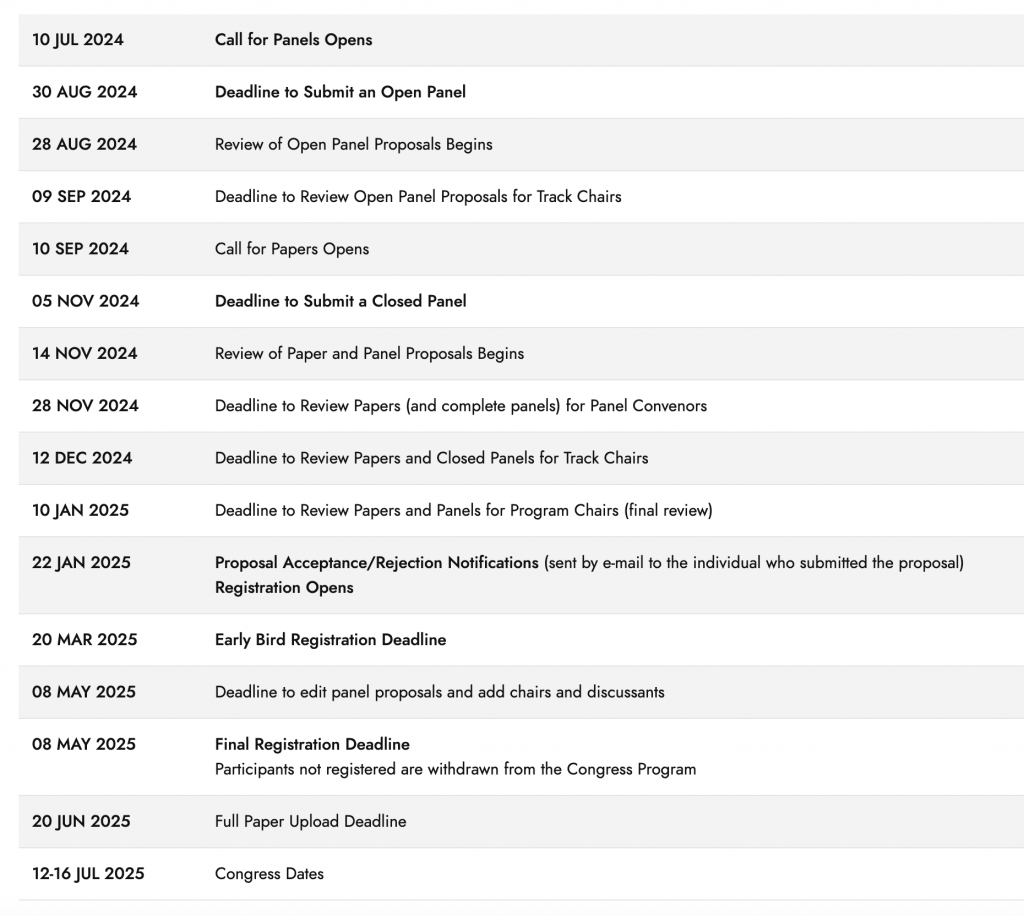le portail de la science politique française
le portail de la science politique française

Le 28e Congrès mondial de science politique de l’IPSA se tiendra à Séoul, en Corée du Sud, du 12 au 16 juillet 2025. Le thème du congrès est « Resisting Autocratization in Polarized Societies » et l’appel à panels ouvrira le 10 juillet 2024. L’AFSP encourage les politistes français à participer nombreux.ses à ce rendez-vous mondial de la science politique !
Toutes les infos ici : https://wc2025.ipsa.org/wc/home
NEW L’appel à panels ouvrira le 10 juillet 2024 !
Toutes les infos…

FOCUS #Thème
Le 28e Congrès mondial de science politique de l’IPSA aura pour thème « Resisting Autocratization in Polarized Societies ».
Autocratic governments are on the rise. Democracies have been eroding from the right and left, from above —leaders— and below —citizens—, but also from outside with the support and guidance of new regional orders. Countries where democracy is well-established or where it is functioning with its minimal foundations, such as elections, are witnessing the expansion of autocratizing politics. Additionally, there is a growing polarization in the understanding of future political, social, and national goals. Societies are becoming increasingly politically and ideologically divided, with each side viewing the other as a problem. Radical polarization among elites but also between society has emerged as a distinctive feature in both Global South and North countries, and it is impacting democracies and international orders.
Some elected leaders are challenging the established rules, undermining the rights of minorities, political and civil rights, and reshaping the political arena to implement their desired policies. At the same time, citizens’ preferences and support for democracy indicate that this regime may no longer be the only game in town. Disenchanted citizens believe that democracy has failed to deliver on its promises or meet their economic, political or social expectations. Autocrats and their policies are becoming increasingly popular among voters, amidst claims of voter suppression and misinformation. Citizens are disaffected and, in some countries, living in perpetual fear. Fake news, post truth politics, and manipulation of events such as war, migration, climate change for political gain are increasingly common and bolstered by digitalization.
We have also verified how new regional orders help leaders with autocratic tendencies to capitalize on citizens’ dissatisfaction with democracy, exploit polarized sentiments, and undermine democracy and rights through policies and legislation justified by national and public security, austerity measures, participatory mechanisms, secure migration, and flexible regulations for fuel and agro-industrial companies.
Despite these facts, some countries have resisted autocratization and implemented timely measures to halt the slow but steady dismantling of democracies. Responsible opposition political parties, independent courts, and active civil society have struggled to uphold democratic rules and values. Furthermore, as their authoritarian counterparts, certain democracies are in a position to support other democratic regimes in resisting autocratization and promoting and protecting democracy through collaboration in regional organizations. To effectively counter the emergence of autocratizing politics and regimes, countries require the support from domestic democrats but also democratic nations and global and regional organizations. These entities can foster cooperation, promote strategies to safeguard democratic values, and contribute to reversing the damage caused by autocratic governments while helping to rebuild democracies.
For the IPSA 2025 World Congress, we aim to draw the attention of the global political science community to issues related to the resistance against autocratizing politics in the context of polarized societies. We actively encourage engaging proposals and discussions on the intricate connections between these phenomena and critical issues such as human rights, civil liberties, inequality, political institutions, public policies, social actors, migrants, digitalization, climate politics, international agreements, and organizations.
FOCUS #DatesClés
Les principales dates-clés du prochain congrès mondial sont connues. A inscrire dans vos agendas et à partager largement dans vos réseaux !

FOCUS #Inscription
Les inscriptions ouvriront le 22 janvier 2025. Plusieurs dates clés à retenir et toutes les informations sur les tarifs à retrouver sans attendre en ligne ici…

FOCUS #Association
L’Association coréenne de science politique est partenaire du congrès.
L’Association coréenne de science politique (KPSA) est une organisation universitaire nationale regroupant des chercheurs intéressés par la science politique, les relations internationales et les disciplines connexes. Fondée en 1953, elle est devenue la plus grande organisation universitaire de Corée, avec plus de 2 700 membres actifs, universitaires et institutions. L’association cherche à encourager les activités académiques et le dialogue intellectuel entre les chercheurs et à promouvoir les échanges académiques et la compréhension mutuelle entre les chercheurs coréens et étrangers.